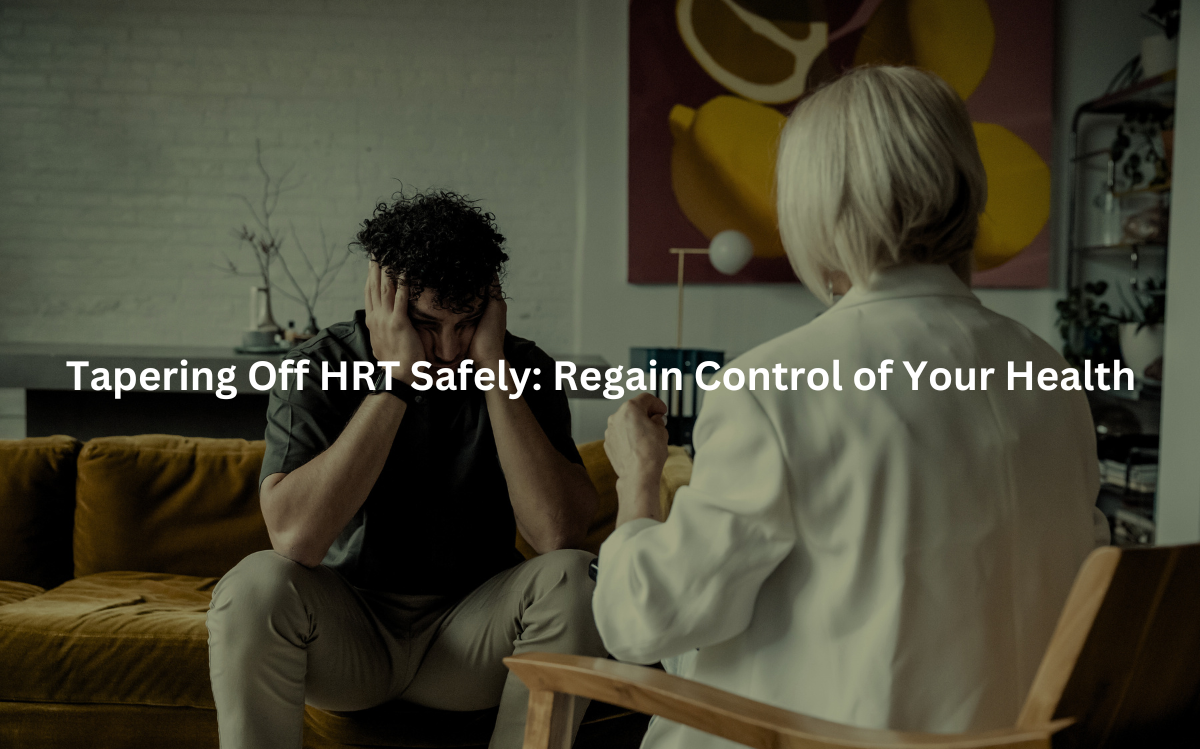Learn how to stop HRT safely with expert tips, minimize withdrawal symptoms, and support your body naturally.
Transitioning off Hormone Replacement Therapy (HRT) can feel overwhelming, but it doesn’t have to be. With the right plan and guidance, you can taper off HRT safely, reduce uncomfortable withdrawal symptoms, and focus on maintaining your health post-treatment. (1)
Key Takeaway
- Menopause symptoms vary widely and can significantly impact daily life.
- Hormone Replacement Therapy (HRT) remains the most effective symptom management tool.
- Lifestyle adjustments, such as diet and exercise, complement treatment plans.
The Physical and Emotional Symptoms of Menopause
Menopause doesn’t have a one-size-fits-all template. It’s often a roller coaster of symptoms, and every woman’s ride is different.
Classic signs include hot flashes (that sudden feeling of being dipped in a heatwave) and night sweats. These can disrupt sleep, leading to fatigue and irritability. Mood swings, depression, and anxiety may also creep in, possibly exacerbated by hormonal fluctuations.
Physically, reduced estrogen levels can lead to vaginal dryness, which might make intimacy uncomfortable, while urinary incontinence and recurrent UTIs are common frustrations. For many, this stage also brings weight gain, particularly around the belly, coupled with a decrease in muscle mass and bone density.
To top it off, symptoms like brain fog and memory lapses can feel like cruel twists of fate during an already challenging time.
Managing Symptoms: Hormone Replacement Therapy (HRT)
HRT stands out as a cornerstone in managing menopause symptoms and improving long-term health. It replenishes declining hormones, mainly estrogen, to counteract hot flashes, mood swings, and even bone loss. (2)
Systemic options like transdermal patches and gels offer whole-body benefits, while vaginal forms target localized symptoms such as dryness or discomfort.
Concerns about breast cancer often arise. Research shows the risk is minimal, particularly with estrogen-only therapy, and is most favourable for women under 60 or within a decade of menopause onset.
For those with cardiovascular risk factors, transdermal HRT is often recommended because it bypasses the liver, reducing clotting risks.
That said, HRT isn’t a standalone solution.
- Symptom management: Reduces vasomotor issues like night sweats.
- Bone preservation: Mitigates osteoporosis by supporting density.
- Heart health: Early initiation may reduce cardiovascular risks.
A personalised approach, guided by a medical professional, ensures the best outcomes.
Nutrition and Lifestyle Adjustments
Weight gain during menopause isn’t just frustrating—it’s physiological. Estrogen’s drop triggers fat storage around the abdomen, while muscle loss slows metabolism. Yet, drastic dieting often backfires, leaving women nutrient-deficient and tired.
A balanced diet packed with fruits, vegetables, lean proteins, and whole grains is key. Omega-3-rich oily fish supports heart and brain health, while vitamin D and calcium protect aging bones. Limiting alcohol and caffeine might help reduce hot flashes and improve sleep.
Exercise, especially strength training, rebuilds muscle and boosts metabolism. Aerobic activities like walking or swimming complement weight management and cardiovascular health. A daily 30-minute walk can work wonders, not just for the body but for mental clarity.
Alternative Therapies and Mental Health Support

For women who are hesitant about using Hormone Replacement Therapy (HRT), there are several alternative therapies that can provide relief.
Cognitive Behavioral Therapy (CBT) is an effective approach for managing menopause symptoms such as mood swings, anxiety, and sleep disturbances. CBT helps individuals identify and change negative thought patterns, which can improve emotional well-being.
While the science on acupuncture and mindfulness practices like yoga is still developing, many women report finding these treatments beneficial for symptom relief. Yoga, in particular, can reduce stress and improve sleep, helping women feel more balanced during this transition. Acupuncture is also believed to help alleviate hot flashes and mood swings, though results can vary.
Mental health support is equally important. Social support from others experiencing menopause can be invaluable. Joining discussion groups or therapy sessions allows women to share their experiences and connect with others who understand.
Sometimes, laughter, such as joking about the forgetfulness that often accompanies menopause, can ease tension and provide emotional relief. These connections are crucial in reducing feelings of isolation, boosting mental health, and enhancing overall quality of life during menopause.
Long-Term Health Considerations
Osteoporosis creeps in quietly after menopause. You might notice how fragile bones seem in older women—it’s not imagination. The drop in estrogen weakens their structure, leaving them brittle. But there are ways to fight back.
- Weight-bearing exercises: Walking or lifting weights can boost bone density.
- Calcium and vitamin D: Leafy greens, dairy, and sunlight help strengthen bones.
- Routine check-ups: Doctors can spot trouble early and recommend supplements.
Heart health doesn’t escape menopause either. Without estrogen’s shield, cholesterol levels rise, and arteries may stiffen. Healthy fats—like those in avocados and almonds—can lower bad cholesterol. A friend once said her daily walk (with the dog!) kept her BP in check.
Practical advice? Keep testing. Bone scans and blood work uncover what’s lurking beneath the surface. Start small with habits that stick—a little light strength training, a handful of nuts, and maybe some sunshine.
Practical Advice for Navigating Menopause
Start Small
Making gradual, manageable changes to your lifestyle can set you up for long-term success. Begin with one small goal, like cutting back on sugary snacks or committing to a daily walk. Small steps can feel less overwhelming and lead to lasting habits.
Once a new habit feels natural, you can move on to the next area to improve, such as adding more vegetables to your meals or getting a few extra hours of sleep. The key is consistency, not perfection. Over time, these small changes add up to a healthier lifestyle that will help ease the symptoms of menopause and improve overall well-being.
Stay Open to Options
Menopause affects every woman differently, and what works for one person might not work for another. While Hormone Replacement Therapy (HRT) is a common choice for managing symptoms, it’s not the only option.
Some women find relief from herbal remedies, acupuncture, or lifestyle changes like exercise and diet adjustments. A healthcare provider can guide you through the options and help you decide what’s best for your body. Exploring alternatives means you can find the treatment that works for you, ensuring you stay comfortable during this phase of life.
Build a Routine
Creating a regular routine can be one of the most effective ways to manage menopause symptoms. Sleep, exercise, and healthy eating are three pillars that support physical and emotional well-being.
Setting a bedtime and sticking to it can help improve the quality of sleep, which many women struggle with during menopause.
Incorporating regular physical activity, like walking or yoga, can reduce stress and boost mood. Eating a balanced diet, rich in whole foods and nutrients, helps maintain energy levels and keeps your body functioning at its best. Consistency is the key—creating simple, sustainable habits can lead to a smoother menopause experience.
Conclusion
Menopause is a unique experience for every woman, and there’s no one-size-fits-all solution. The key to managing this transition effectively lies in combining symptom management, informed decision-making, and personalized care.
Hormone Replacement Therapy (HRT) can be highly beneficial, offering relief from symptoms, improved bone health, and even some cardiovascular protection, when suited to individual needs.
For women who can’t or prefer not to use HRT, alternative therapies, lifestyle adjustments, and regular consultations with healthcare professionals are essential. These options help manage symptoms and support overall well-being during this phase of life.
Ultimately, the goal is to make menopause a time of empowerment. By staying informed, embracing a balanced lifestyle, and seeking professional guidance, women can navigate menopause with confidence and maintain their health and vitality long-term.
Ready to explore your options? Book a consultation with Modern Menopause today and get the support you need to feel your best. Book your appointment now.
FAQ
How can I taper off HRT safely?
Tapering off HRT safely means gradually reducing the dose rather than stopping abruptly. This helps minimize risks like hot flashes and other menopausal symptoms. The amount of time to taper off depends on the type of HRT you’re using and how your body responds.
Gradual reduction is generally recommended for women’s health to avoid potential risks like hormonal imbalance and to give your system time to adjust.
What are the risks of stopping HRT suddenly?
Stopping HRT suddenly, or “cold turkey,” can trigger rebound symptoms, such as hot flashes, night sweats, and mood swings. This is because the body is used to the hormones from HRT. It can also increase the risk of vasomotor symptoms and other menopausal side effects. It’s crucial to wean off HRT over time, especially if you’ve been using it for a longer period.
How long does it take for HRT to leave your system?
The length of time it takes for HRT to leave your system depends on the dose of HRT and whether you’re using estrogen and progestogen or just estrogen replacement. It can take several weeks for synthetic hormones to leave your system, but the process varies. Your health conditions and the type of hormone therapy you’ve used play a role in how quickly it clears out.
What are the side effects of stopping HRT?
When stopping HRT, you may experience side effects such as hot flashes, mood swings, or sleep problems. These symptoms are common during the menopause transition, especially if you’ve used a high dose of HRT for a long period. Some women also notice weight changes or a return of vaginal dryness. To ease these symptoms, some use herbal alternatives like black cohosh or chaste tree, though their effectiveness can vary.
Can stopping HRT help me lose weight?
Stopping HRT may lead to weight changes, but it isn’t a guaranteed way to lose weight. In some cases, weight may increase as the body adjusts to lower estrogen levels. Hormonal imbalances can affect metabolism and fat distribution. Maintaining a healthy diet and exercise routine is crucial. For those looking to manage symptoms, supplements like dong quai or chaste tree may help balance hormones, but should be reviewed by a doctor first.
References
- https://pmc.ncbi.nlm.nih.gov/articles/PMC2758567/
- https://www.ncbi.nlm.nih.gov/books/NBK493191/

Leave a Reply